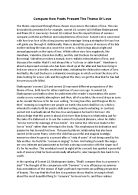The second stanza explores Marilyn’s dream-filled youth. She dances in a ballroom, watched by a ‘thousand eyes’ and dreaming of ‘fizzy movie tomorrows.’ This vibrant language is well-suited to the character of the mother, romanticizing her youth and setting a glitzy and almost ‘Hollywood’ tone to it. The poet obviously looks very highly at her mother and also demonstrates pride when she says ‘I knew you would dance like that,’ showing another degree of love in their relation; where in a relationship built with lust would make you jealous at the idea of a ‘thousand eyes’ gazing at the one you love, her relationship allows her to be happy for her, further proving the love’s credibility. But then we are made to learn about the imperfections of her glitzy lifestyle too, a worrying mother at home. ‘Hiding for the late one,’ this line shows a note of understanding. Here the poet is able to relate to her mother by mentioning her breaking her curfew, and by doing so it breaks down the social connotations that a mother typically tends to be estranged from her daughter because of the generation gap. This idea is built upon when she says ‘You reckon it’s worth it.’ Not only does this line hold a tone of confidence of her thoughts, it also directly addresses her mum and displays a sisterly bond.
The regular stanza pattern also seems to build on the idea of ‘real’ love as no advanced techniques of poetry are used. This contrasts the use of a traditional sonnet structure, equipped with the Iambic Pentameter that Shakespeare uses. The choice of using this structure emphasises his genuine love as Sonnets are typically about love poems. But ironically, the content of the Sonnet is as unorthodox of a love poem as possible. Shakespeare’s intention in this is to strip away all the pretences of love found in love poem’s formed by excessive uses of clichés like ‘her voice being sweeter than music’, parody it: ‘’music hath a far more pleasing sound,’’ and present the audience with the residue; genuine love. After all she is a mere mortal like the rest of us, not a ‘goddess.’ He continues taking more clichés found in typical love poetry than turning it around to make a mockery out of it; ‘Coral is far more red than her lips’ red.’ His attempt to revolutionise love poetry can be seen as a bold move, he even goes on to say ‘black wires grow on her head,’ and even comparing his mistress to a troll-like creature, ‘when she walks treads on the ground.’
He is obviously having a lot of fun writing this poem, using heavy sarcasm, mocking traditions and even mocking other poets and their use of corny images in their sonnets. This tirade of insults would be seen as some to be a very foolish act which ends with a slap, but he proves this idea wrong when he separates the last two lines of the poem. The indentation of the last two line, I believe, symbolises the fun from the honesty. This idea is emphasised when we notice a change from heavily poetic language filled with metaphors to much more straightforward language. He here admits to his ‘love as rare.’ This contrasts his bluntness and straightforwardness present throughout the poem. The bluntness previous to the two lines implies that his love is ‘real’ and says that even when the looks and the false promises of love are taken out of the context, genuine love still exists. The poem isn’t entirely based on criticisms and flaws though, the last line perhaps is the most charming line, a line which reduces all the clichés Shakespeare put forward before to child’s play. ‘As any she belied with false compare,’ this line ultimately implies that she is better than all the fake images.
Much like Shakespeare who refuses to let his lover be compared to such common images, Duffy holds a lot of respect for her mother. In the third stanza, now when she was born, she reminisces of her mother’s ‘high heeled red shoes.’ She calls them relics. This religious reference shows an almost reverential love for her mother and implies that she is holy, perhaps even an angel. In this paragraph though, we find the first sad undertones of this poem. She says ‘your ghost clatters toward me’ and thus implying the exciting, loud and easy-to-be-fond-of character that she romanticized throughout the poem, is now dead. This feeling of nostalgia though is balanced out when her mother is shown to still contain the youth she once used to have by doing the ‘Cha cha cha!’ and teaching her little girl ‘the steps on the way home from Mass.’ Yet the poem is left on a sad note. The poet is seen to be left desiring the ‘girl winking in Portobello’ for her mother, not the stressed, grey-haired mother she might be right now. But the excitement and glamour built throughout the poem clearly overrides this and the poem is ultimate one of celebration not sorrow.
And just like Shakespeare’s Sonnet 130, Before You Were Mine is another poem that exposes genuine love. Similar to Shakespeare’s ‘stripping away’ of all pretences in love, Duffy strips away her role as a daughter in the two’s relationship, and solely focuses on just her mother’s life and celebrating it grandly, and by doing so she displays a pure, completely selfless and unconditional love.
Shamdyad Khan 11P







